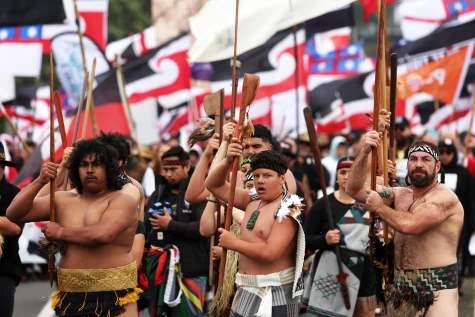
Keely Cabatuan | Photo Editor
November 15, 2024
In a powerful show of resistance, hundreds of Māori protesters gathered outside New Zealand’s Parliament on November 14th to perform the haka, a traditional Māori war dance, in opposition to a controversial bill being debated by the government. The legislation, widely referred to as the “Indigenous Bill,” has sparked intense debate, with many Māori leaders and activists arguing that it threatens Indigenous rights, sovereignty, and cultural protections.
The haka, which Māori has long used as a form of expression in both celebration and protest, echoed through the streets of Wellington as the protesters made their voices heard. The performance was not just a cultural display but a bold statement, a call for justice, recognition, and change.
The “Indigenous Bill” and Growing Concerns
The protest centers around the belief that the “Indigenous Bill” undermines Māori rights and the Treaty of Waitangi, which underpins New Zealand’s relationship with its Indigenous people. Critics argue that the bill weakens protections for Māori land, resources, and cultural heritage, and fails to adequately consult with Māori communities, despite its significant implications for them.

Protesters express deep frustration, asserting that their voices have long been ignored. Activists are particularly disappointed that the government has not sufficiently addressed the pervasive inequalities Māori face in areas like health, education, and employment. They stress that this issue goes beyond a single piece of legislation; it is about creating a future where Māori culture is respected, and their rights are safeguarded for future generations.
The haka as a call for solidarity
The haka is more than just a performance; it is a call for unity and solidarity. In the context of today’s protest, it became a rallying cry not just for Māori, but for all New Zealanders to stand in defense of indigenous rights. By bringing the haka to Parliament’s doorstep, the protesters sought to show the government that the fight for Māori rights cannot and will not be ignored.
This demonstration highlighted the ongoing challenges faced by Māori, who continue to endure disproportionate rates of poverty, health disparities, and underrepresentation in political spheres, despite some progress. As Hazel Marsh, a sophomore from SCHS, would say, “It’s emotional, it’s moving.” The sound of the haka echoing through Wellington served as a poignant reminder that the struggle for Māori rights is far from finished.
A promise of resistance
The haka performed today resonated deeply beyond mere protest; it served as a poignant promise that the Māori people will steadfastly uphold their unity and strength in the ongoing struggle for justice and recognition of their rights. This powerful display outside Parliament was not only a cultural affirmation but also a vibrant symbol of resilience against government policies perceived as oppressive or detrimental to their traditions and heritage. The undulating chants and synchronized movements echoed the collective heartbeat of the Māori community, demanding attention and accountability from those in power. Now, the crucial question remains: will the government heed this profound plea and take meaningful actions that honor the rights, dignity, and cultural identity of New Zealand’s Indigenous people, ensuring that their voices are not just heard but respected and integrated into the fabric of national policies?

Leave a Reply